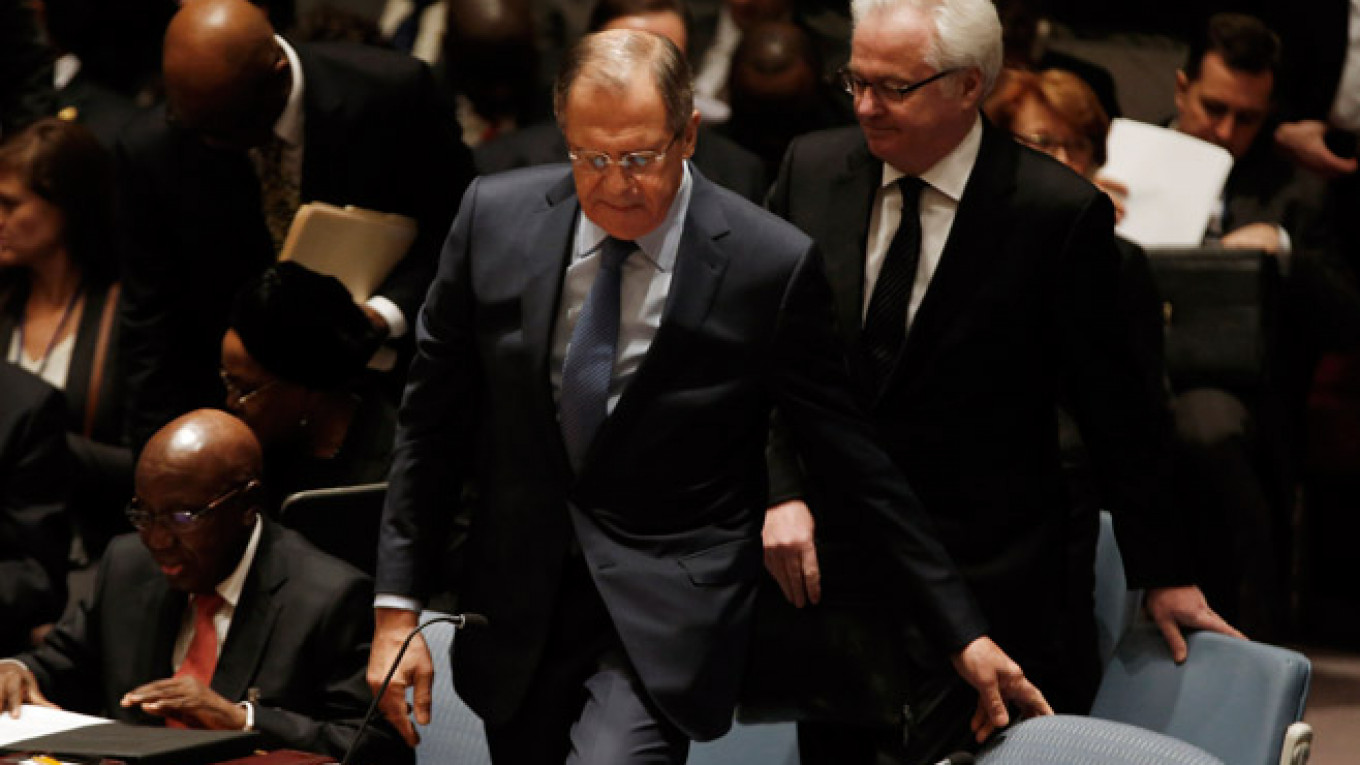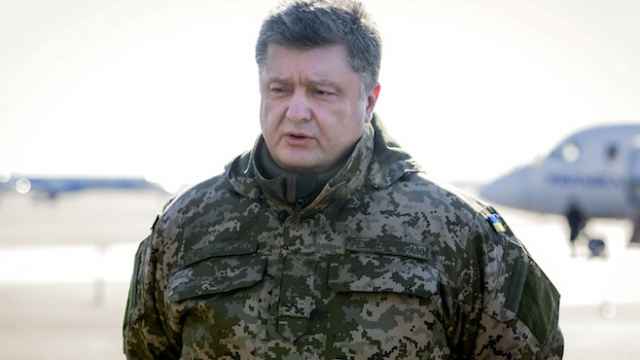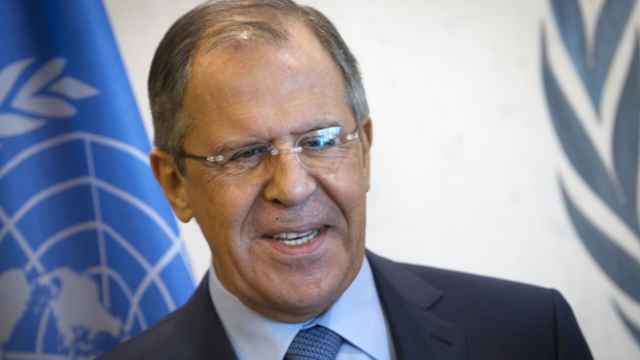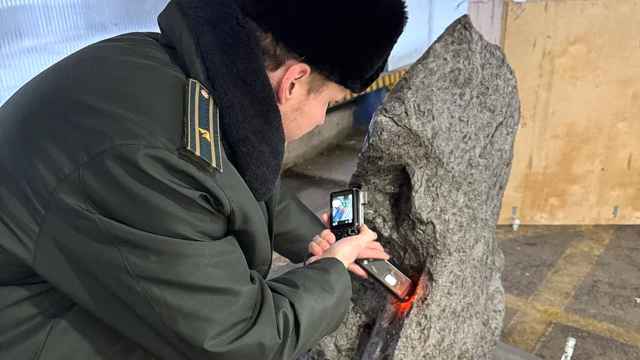In its freshly released annual report, Amnesty International blasted Russia for a broad range of policy issues, from the heavy-handed use of its United Nations veto power, to controversial legislation serving to stifle civil society.
UN Security Council Reform
Russia wasn't the only country that fell afoul of the London-based human rights organization's standards in 2014. The global community as a whole responded to the many conflicts and rights abuses that emerged during the course of the year in a manner that was "shameful and ineffective," the report said.
Citing the general futility of recent peace efforts, Amnesty International called for reforms to the Security Council, the United Nations organ charged with maintaining international peace and security. The council has five permanent members — Russia, United Kingdom, the United States, France and China — and each enjoys veto power over council decisions. At any given time, the council also has 10 non-permanent members, comprised of UN member states serving two-year terms on a rotating basis. The non-permanent members do not enjoy veto power.
To avoid the stalemates that use of the veto power tends to foster, Amnesty International argued that the Security Council's permanent members should be made to surrender their veto rights in cases involving genocide and other mass atrocities.
Russia's right to veto has prevented the Security Council from taking truly effective action with regard to the Ukraine crisis, the report said. Since April, the ongoing conflict in Ukraine has already claimed the lives of more than 5,600 people and has led to the displacement of more than one million civilians.
"We believe that permanent members of the UN Security Council should conduct themselves in a responsible way, refraining from blocking initiatives that could change or end a [conflict] situation," Anna Neistat, senior director for research at Amnesty International, told journalists on Tuesday in Moscow, indicating that Russian obstructionism had compromised international conflict resolution initiatives.
Russia has used its veto power more than any of the other permanent members of the council, having blocked 101 resolutions since the UN's establishment in 1945. By way of comparison, the United States blocked 79 resolutions during the same period.
Last March, on the eve of a Crimean referendum to secede from Ukraine, paving the way to Russia's annexation of the peninsula, Russia was the lone Security Council member to veto a resolution criticizing the vote.
In May, Russia and China blocked a draft UN resolution calling for the Syrian crisis to be referred to the International Criminal Court, thus preventing the prosecution of those responsible for crimes against humanity in a country that has been ravaged by a bloody civil war since 2011. This resolution was the fourth Russia vetoed with regard to the crisis in Syria.
Russia has already expressed its reluctance to part with its veto rights, which have faced criticism in the past for making some countries more equal than others at the United Nations. Russia's envoy to the UN, the pugnacious Vitaly Churkin, publicly opposed limitations of Russia's veto rights during the UN General Assembly in September.
Amnesty International noted in its report that it was far from optimistic about the prospect of successfully stripping world powers of their ability to obstruct UN initiatives.
"It would be very difficult to impose this [the removal of veto rights] in the UN's current framework and structure," Neistat said. "We are not talking about a complete rejection of veto rights, which can still be used in a broad array of situation. We are talking about the renouncement of veto rights in situations in which thousands of peoples' lives are being threatened."
Tensions With the West
Amnesty International's annual report lists as Russia's key human rights issues: restrictions on the fundamental freedoms of expression, assembly and association, state pressure on civil society and political activists, torture allegations and the volatile situation in the North Caucasus.
"The list of sad issues [with regard to Russia's human rights record] is quite long," said Sergei Nikitin, director of Amnesty International's Moscow office, adding that the country's human rights issues greatly outweighed positive developments in the field.
Russia's current economic woes and the deterioration of its relations with the West following the outbreak of the Ukrainian crisis will likely take a toll on its human rights record, according to the organization.
The current tensions could prompt the Kremlin — which Amnesty International has accused of "muzzling the media, toxically branding NGOs as 'foreign agents' and unfairly imprisoning activists" — to grow increasingly nervous and further stifle domestic dissent, the report warned.
Amnesty International's Moscow press conference Tuesday, attended by Russian state-run, independent and foreign media outlets alike, was interspersed with awkward silences and unspoken questions surrounding Russia's alleged role in fueling strife in Ukraine and the state media's lopsided coverage of the crisis.
"What do you think of [U.S. President Barack] Obama's latest political actions toward Ukraine?" a journalist from the state-controlled NTV channel asked, echoing a narrative espoused by Russian officials about the West's responsibility for the bloodshed in Ukraine.
Neistat and Nikitin glanced at each other in apparent disbelief over the question. Journalists’ reactions were mixed, with some smiling or chuckling, while others waited with bated breath for Amnesty International’s take on the U.S. commander in chief. The answer wouldn't come. The organization's experts declined to comment on a question they said was political, and ill-fitted for a human rights organization to speculate on.
Later during the press conference, the Amnesty International experts deplored the global proliferation of non-state militant groups, which they said had committed human rights abuses in at least 35 countries during the course of 2014. While Neistat cited the Islamic State, Boko Haram and Al Shabab as non-governmental armed groups, one unuttered question loomed large in the cramped press room.
Finally one journalist verbalized it: Does Amnesty International also consider the pro-Russian rebels of the self-proclaimed Donetsk People's Republic (DNR) and the Luhansk People's Republic (LNR) to be among their number?
"Yes" was the organization's short answer.
"Like other armed groups, the self-proclaimed DNR and LNR are faced with the absence of determined structures of command and responsibility, and the absence of [overarching] structures to pressure them, given that they are non-governmental entities," Neistat said.
"Sad" Legislation
"The situation of independent social organizations has greatly deteriorated," Nikitin said. "This is no secret to anyone because the sad 'foreign agents' law is gaining strength. There is no sign of this stopping."
In 2012, Russia tightened control over NGOs, adopting legislation that requires nongovernmental organizations to register with the Justice Ministry under the politically charged label "foreign agent" if they receive funding from abroad and conduct loosely defined "political" activity. The legislation was amended in June 2014 to allow the ministry to tag any NGO with the "foreign agent" label without its consent.
There are currently 41 nongovernmental organizations listed on the Justice Ministry's register of "foreign agents," including prominent election monitoring organization Golos and the Memorial human rights group.
Amnesty International has had its own share of run-ins with the Russian authorities. In March 2013, three representatives from the Prosecutor General's Office and tax police raided its Moscow office in a quest for documents Nikitin said could have easily been obtained from the Justice Ministry.
A few months later, Nikitin was summoned by authorities to review a technical formality in the organization's activities, a move he interpreted as an attempt by the authorities to frighten him and to remind members of Russian civil society who's really in charge.
"None of these [accused] organizations are 'foreign agents'," Nikitin said. "They are the best kind of patriots — the people who work for the benefit of their country."
Contact the author at [email protected]
A Message from The Moscow Times:
Dear readers,
We are facing unprecedented challenges. Russia's Prosecutor General's Office has designated The Moscow Times as an "undesirable" organization, criminalizing our work and putting our staff at risk of prosecution. This follows our earlier unjust labeling as a "foreign agent."
These actions are direct attempts to silence independent journalism in Russia. The authorities claim our work "discredits the decisions of the Russian leadership." We see things differently: we strive to provide accurate, unbiased reporting on Russia.
We, the journalists of The Moscow Times, refuse to be silenced. But to continue our work, we need your help.
Your support, no matter how small, makes a world of difference. If you can, please support us monthly starting from just $2. It's quick to set up, and every contribution makes a significant impact.
By supporting The Moscow Times, you're defending open, independent journalism in the face of repression. Thank you for standing with us.
Remind me later.






